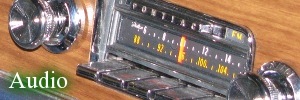















Gasoline Distillation System Cuts Auto Emissions |
|---|

|
Butler Cain
Tuscaloosa, Alabama
Voice of America
September 11, 2006
 Listen to Gasoline Distillation System Cuts Auto Emissions - MP3 - 1.0MB - 4:20
Listen to Gasoline Distillation System Cuts Auto Emissions - MP3 - 1.0MB - 4:20
 Listen to Gasoline Distillation System Cuts Auto Emissions - RealPlayer - 675KB - 4:20
Listen to Gasoline Distillation System Cuts Auto Emissions - RealPlayer - 675KB - 4:20
The upcoming edition of the journal Environmental Science and Technology features an article on a new fuel system that would help reduce automobile emissions during a vehicle's warm-up. A lead author of the paper explains that the idea is to cut down on a particular type of air pollution closely associated with automobiles.
Early September is still oppressively hot throughout the American South, and in his office at the University of Alabama, assistant mechanical engineering professor Marcus Ashford has his air conditioner on full blast. The cool, crisp air in his office is quite different from the type of air quality he has been most concerned about lately - an unhealthy mix of airborne pollutants called smog.
"It takes three things to make smog," he explains. "You take hydrocarbons, oxides of nitrogen, and sunlight. You mix them together and you get smog. And if you can take one of the legs of that triangle away, then you can make some great strides. So our idea is to go after the hydrocarbons."
Most motor vehicles are powered by hydrocarbon-based fuels such as gasoline and diesel. The U.S. Environmental Protection Agency says hydrocarbon pollution is produced when unburned fuel leaves an automobile as exhaust. Professor Ashford says it is at its worst during the first moments after starting the engine. "When you're starting a vehicle, not all of the fuel that you'll inject will actually go toward starting your car. Anywhere from 10 to 30% of it will actually vaporize. So we have to make up for that by injecting 5 times, 10 times, 15 times as much fuel as you would ordinarily need if the engine were already warm."
The unburned fuel comes out of the exhaust pipe as hydrocarbon pollution. "What you end up with is in the first 30 to 60 seconds after you start the car, you're creating anywhere from 60 to 90, 95% of your hydrocarbon emissions." Once the engine warms up, emissions go back down. But Ashford says by then, it is too late.
He and a colleague at the University of Texas have developed a new fuel system to solve that problem. It's called the On-Board Distillation System. It automatically uses the gasoline that is already in your car to create another type of fuel. "We heat up the gasoline," Ashford explains. "The lighter parts of it, or the parts that we want, vaporize. We take them, separate them away from the liquid, condense them, and we save that in a special tank." The new fuel is injected into the engine at start-up. It's more volatile than gasoline, so much more of it burns away when the engine is started.
Ashford says the first test results were very positive. "We were able to cut hydrocarbon emissions entirely by over 80%."
The On-Board Distillation System is still in the experimental phases, though. Ashford says the current model consists of several pieces that have been placed in different areas of the test automobile. He says he believes a commercial version of the system would be no larger than a shoebox, and it would most likely sit next to the gas tank. That presents a potential problem, however - not with the system itself, but with how people will react to it. "There's this idea that we want to keep a flask or a small tank of highly volatile fuel on board, and that gives some people the willies. Gasoline is pretty volatile all by itself. It's just not great for starting an engine with."
Ashford's idea has also received some criticism from others, including potential competitors at corporations or other universities. "Some of [their alternative ideas] are actually pretty good," he admits, "the kind that make me sit back and say 'I wish I had thought of that.' But hopefully, with what we're coming up with in the near future and what we've already been doing, we'll be making a lot of other people say 'I wish I had thought of that.'"
And there is already some commercial interest in this new approach to pollution control. Ashford says he's heard from a handful of companies. "I have had some conversations with a company that we're working with right now on getting some work done and doing some contracts because they would like to build a small, commercial-ready version of it." He says he hopes that process will get started sometime in October.
In the meantime, Professor Ashford says the field of mechanical engineering is ever changing. He says even though he has worked very hard on perfecting the On-Board Distillation System, current experiments being conducted at the University of Alabama could eventually improve - or even replace - his idea.
